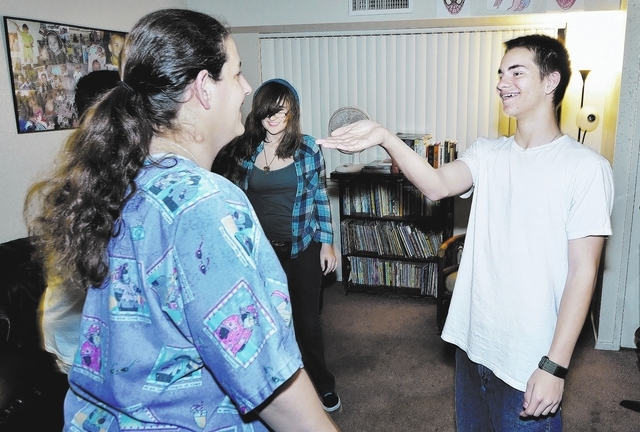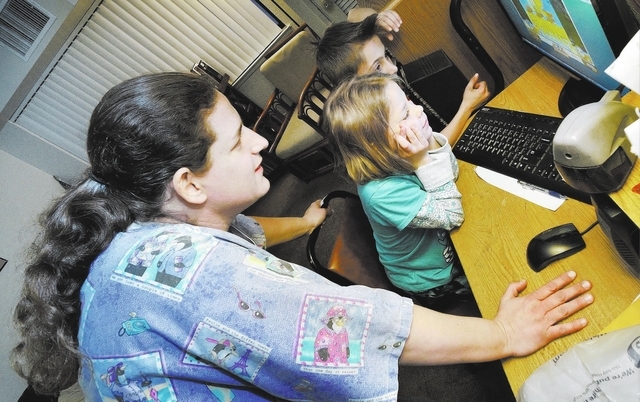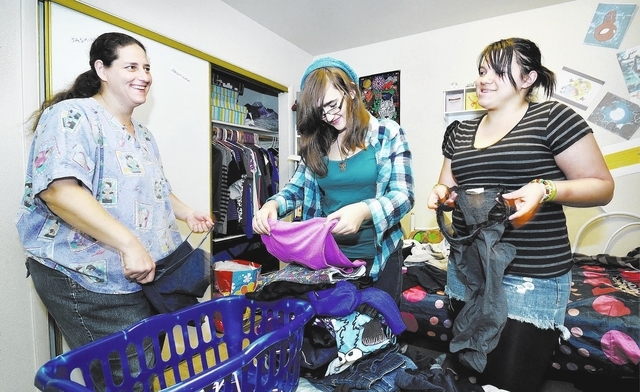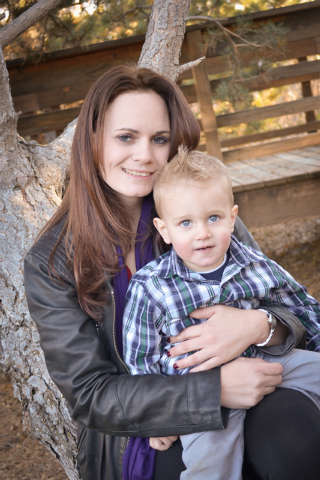Budget cuts slow program to foster independence
Ask 39-year-old single mother Barbara Conant how she makes it raising three teenagers, including her elder daughter’s 16-year-old best friend, and a 7-year-old — all while working at a day care center. She’ll tell you that the child care subsidy she receives through the Las Vegas Urban League Early Childhood Connection makes a life-changing difference.
It was the same initially for Dana Coburn, a 30-year-old single working mom of a 1½-year-old son. After nearly a year, however, her subsidy disappeared. She was surprised to find that she no longer qualifies for the program.
Budget cuts from a few years back continue to slow progress of the program that is designed to help families become more independent.
“We want to keep those people who are low-income working, so they aren’t relying on other state-funded resources, whether it be food stamps or other programs,” says Michael Maxwell, vice president for agency innovation and director of the Early Childhood Connection. “Day care can cost anywhere from $500 up to $700 a month, per child. If you are barely making $2,400 and a third of that is going to child care, some parents make the choice to say: ‘This doesn’t make any sense. I’m doing all this work and I can barely afford to pay for child care.’ They decide to stay home. That’s what we don’t want.”
Even while working as a child care provider at Babyland Infant Center &Preschool, Conant still has to pay to take 7-year-old Emily along. Without the subsidy, which covers about 95 percent of her child care costs, she says: “I’d probably have to work at night. This way it helps me because I can work during the day and be home with my children at night when I should, rather than them watching and raising their little sister while I’m trying to work, trying to have money for them. She’s my child, not her brother and sister’s child.”
The Early Childhood Connection, formerly known as the Child Care Subsidy Program, at the nonprofit Las Vegas Urban League serves about 3,750 children, a number that fluctuates weekly, Maxwell says. It provides access to quality child care and connects families to community resources for self-sufficiency.
The program is funded through the Nevada Division of Welfare and Supportive Services, with the help of a federal block grant. As its child care fiscal agent, the Early Childhood Connection supplies families with certificates that can be applied toward day care centers registered with the program, which are reimbursed. The Division of Welfare’s Child Care Development Program determines eligibility requirements.
Single-parent households are the norm among those families, Maxwell says, with 33.4 percent of the children being African-American, 33.1 percent Latino and 23.6 percent white.
Amanda Haboush-Deloye, senior research associate at the Nevada Institute for Children’s Research and Policy, has done advocacy training with families that have benefited from the Urban League program.
“When we ask them, ‘What would it be like if you were to lose this tomorrow,’ they say that they would have to quit their jobs because they’d have to stay home with their kids,” Haboush-Deloye says. “Their kids would not be making the educational advances that they are, because the subsidy dollars go to centers that have education programs, that don’t offer just baby-sitting.”
But some families have fallen through the cracks.
Coburn moved to the Las Vegas Valley in August 2012 with her son, Kade. After about a month of receiving cash aid and food stamps, she says she found a job. She was told that she could get assistance for day care through the Urban League.
“It was wonderful,” she says of the subsidy she received until this past summer. “They gave me the full amount that they were willing to pay, which I believe was $180 a week.”
Coburn found an inexpensive day care and covered about 20 percent of her own day care expenses, she estimates. She was making $9.50 an hour, working 40 hours a week, with no child support from her son’s father. Living with her mother has been her one saving grace, she says, although her mother isn’t financially able to provide much beyond that.
“It makes sense for them to expect you to pay at least some of it,” she says of child care costs. “But when you’re a single mom, you make barely over minimum wage, and you’re trying to go to work and do everything that you’re supposed to — and I’m not trying to take advantage of the programs. I just needed help with the day care assistance.
“But they required me to apply for the cash,” she adds. “And when they denied me, I’m underneath the poverty level, I’m underneath about $18,000 a year. I thought that I would receive the cash aid.”
Even at that income level, Coburn says she didn’t qualify for cash aid.
Coburn works for a real estate company. She started by folding and mailing letters, but has since branched out, ensuring that property photos hit the right websites and taking care of graphics, design and social media. But, she says, her financial position remains dire, with the constant juggle of deciding which bills to pay — and which to skip.
If she quit her job and went on cash assistance, she says, she might be doing better. Or even, if she stopped working as much.
“If I did find a mediocre job that paid me for 20 hours a week, I would get to spend more time with my son,” she says. “And they would give me cash aid and pay for my day care. It almost makes me want to make less. To be more dependent on their system. That’s not something that you want to do. I feel like I need the work, and it’s good for me to work, and my son needs me to work. I have to take care of him. Clothes. Diapers. It’s amazing how much everything can cost.”
Maxwell says Coburn’s situation is “the unfortunate outcome” of budget cuts from two years ago — and intersects with problems of the minimum wage. Remedies may be difficult, but some help could be on the way. President Barack Obama recently signed the 2014 omnibus appropriations bill, with $2.36 billion going to the Child Care and Development Block Grant, an increase of $154 million from fiscal 2013. The grant provides money to states for working family child care assistance, and for boosting the quality of child care programs nationwide. The office of Sen. Harry Reid, D-Nev., says it currently helps 7,300 Nevada children.
Meanwhile, organizations such as the Nevada Association for the Education of Young Children and the Children’s Advocacy Alliance will continue to work to bring attention to parents such as Coburn, through advocacy and lobbying.
Although parents such as Coburn may not get the benefit of the child care subsidy for now, Maxwell says, they can call the Urban League and ask about other assistance, whether it’s with rent, transportation issues, or other child care-related programs.
Coburn says that she didn’t get anywhere on her first try at going back to the Urban League for help. But she’ll try again.
“I’ve heard from some people, ‘I can’t get in,’ ” Conant says. “Or, ‘There’s a waiting list.’ I tell them, ‘Just keep trying.’ ”
Reach the Las Vegas Urban League Early Childhood Connection at 702-473-9400.























